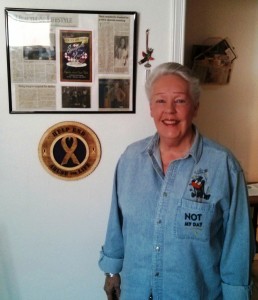The leaders of Help End Abuse for Life and The Nest pride themselves not only on the mission of their organization, but also on its effective implementation. One of the most powerful services provided at The Nest are the shelter’s educational groups, which provide classroom lessons in a support group setting that are aimed at shedding light on issues that complicate and intensify domestic violence. Topics range from personal finance, substance abuse, parenting child witnesses of domestic violence and using faith as a healing tool.
One of the newer groups, called the TREE Program, was designed in-house by Advocate Kathryn Walker. TREE is an acronym for Trauma, Recovery, Education and Empowerment. It aims to assist clients with taking more active and conscious choices in their actions and words. After launching the program late this summer, Walker is excited to announce that new and deeper topics are springing up all over. “The TREE Program is growing,” Walker joked.
“The program comes from the theory of psychiatrist Eric Berne, called transactional analysis,” Walker said. “It uses language to describe and explore what is called transactions – the dynamics between people during their interactions. I think it’s the easiest way to identify what’s happening in these violent relationships so it is an ideal way to help our clients in a short period of time.”
The TREE Program offers clients the opportunity to regain control through choices of how to act in different transactions. The ability to control actions is important for victims of emotional abuse, who have often been led to believe that they are crazy, that they are responsible for the abuse or that they are out of control. Emotions are one of the harder things to own. “After being battered, the clients react,” Walker said. “Realizing that they have different aspects of their personalities that can act, some more effectively than others, gives them the power to stop reacting – to stop ‘being along for the ride.’”
The TREE program also helps clients identify the roots of who they are, in a gentle manner. Clients are not expected to work through their experiences, but rather to learn how to recognize when experiences are shaping their choices. “We don’t make them drag up their baggage,” Walker said. “We just give them the tools to see where different ideas, scripts, or reactions came from. We believe that once they know the basics – the tools – that it will come to fruition someday, in a different setting. Then they can let go of it and nourish the more healthy roots.”
Walker, who served as Chief Operations Officer for HEAL and is one of the longest-serving advocates at The Nest, has worked with victims and survivors of domestic violence with an outstanding mix of patience, knowledge and empathy. Her skills were honed as a Licensed Chemical Dependency Counselor for more than 25 years, and included a stint in the military as a substance abuse and mental health counselor.

Pictured is Kathryn Walker, creator of the TREE Program at the Nest.


